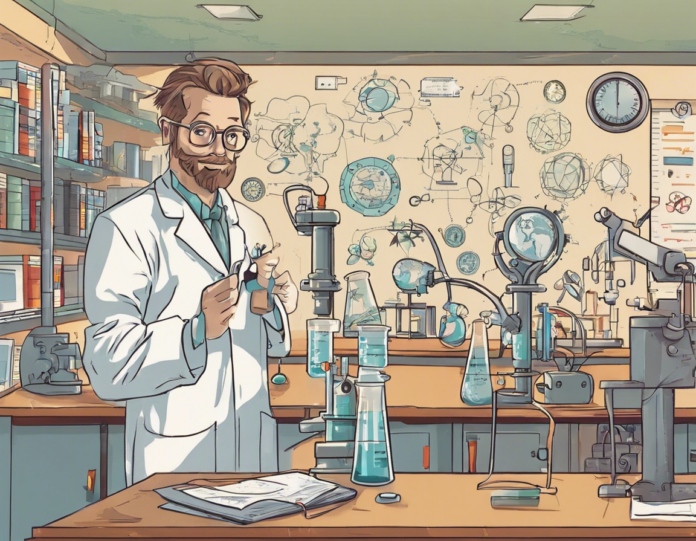Introduction
Embarking on a career as a scientist is a rewarding and intellectually stimulating journey. Whether your passion lies in biology, chemistry, physics, or any other field of study, the path to becoming a successful scientist requires dedication, hard work, and continuous learning. In this comprehensive guide, we will delve into the essential steps to kickstart your career as a scientist, from education and research experience to networking and professional development opportunities.
Education in Science
The foundation of a career in science is a solid education. Pursuing a bachelor's degree in a scientific field, such as biology, chemistry, physics, or environmental science, is the starting point for most aspiring scientists. During your undergraduate studies, focus on building a strong understanding of fundamental scientific principles and concepts. Engage with your professors, participate in research projects, and seek out internships to gain practical experience in your chosen field.
After completing your bachelor's degree, many aspiring scientists choose to pursue a graduate degree, such as a master's or Ph.D., to further specialize in their area of interest. Graduate programs provide advanced training in research methodologies, critical thinking, and data analysis, equipping you with the skills needed to conduct independent research and make significant contributions to your field.
Gaining Research Experience
Hands-on research experience is crucial for aspiring scientists. Seek out opportunities to work in research laboratories, either through internships, volunteer positions, or research assistant roles. Collaborating with experienced scientists and participating in research projects will not only enhance your technical skills but also expose you to the rigors of the scientific process, from formulating hypotheses to analyzing data and drawing conclusions.
If you are a graduate student, securing a research assistantship or fellowship can provide valuable funding and allow you to focus on your research full-time. Additionally, presenting your research at conferences and publishing in scientific journals are essential for building your research portfolio and establishing yourself as a promising scientist in your field.
Networking in the Scientific Community
Networking is a powerful tool for advancing your career as a scientist. Attend conferences, seminars, and workshops in your field to connect with fellow researchers, industry professionals, and potential collaborators. Building a strong professional network can open doors to new opportunities, such as research collaborations, postdoctoral positions, or employment opportunities in academia or industry.
Joining professional organizations, such as the American Association for the Advancement of Science (AAAS) or the American Chemical Society (ACS), can also provide networking opportunities, professional development resources, and access to the latest advancements in your field. Engage with your peers, attend networking events, and stay up-to-date with industry trends to foster valuable connections and expand your professional network.
Professional Development as a Scientist
Continuous learning and professional development are integral to a successful career as a scientist. Stay current with the latest research findings, technological advancements, and best practices in your field by attending workshops, webinars, and continuing education courses. Many professional organizations offer certifications and training programs to help scientists enhance their skills and expertise in specific areas.
Developing strong communication and writing skills is also essential for scientists, as you will often need to present your research findings, write grant proposals, and publish scientific papers. Practice communicating your research to both technical and non-technical audiences, and seek feedback from mentors and colleagues to improve your presentation skills.
Frequently Asked Questions (FAQs)
-
Q: What are the different career paths available for scientists?
A: Scientists can pursue careers in academia, industry, government agencies, non-profit organizations, and research institutions. -
Q: How important is mentorship in the field of science?
A: Mentorship plays a crucial role in the development of aspiring scientists, providing guidance, support, and valuable insights into the research process. -
Q: What skills are essential for a successful career in science?
A: Strong analytical skills, critical thinking, problem-solving abilities, and effective communication are essential for success as a scientist. -
Q: How can I secure funding for my research projects?
A: Scientists can apply for research grants from government agencies, foundations, and academic institutions to fund their research projects. -
Q: What are some tips for balancing work and personal life as a scientist?
A: Establishing a healthy work-life balance, setting priorities, and practicing self-care are essential for maintaining overall well-being as a scientist.
In conclusion, embarking on a career as a scientist is a fulfilling journey that requires dedication, perseverance, and a passion for discovery. By pursuing a strong education, gaining research experience, networking with peers, and investing in professional development, you can lay the foundation for a successful and rewarding career in science. Stay curious, embrace challenges, and continue to learn and grow as a scientist, making meaningful contributions to the world of science and beyond.

